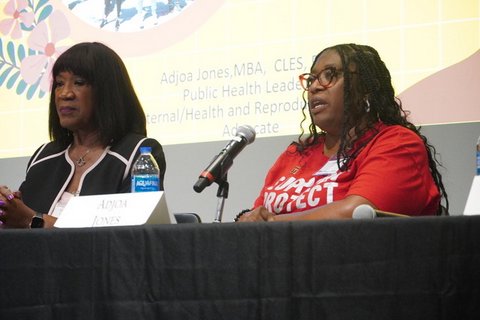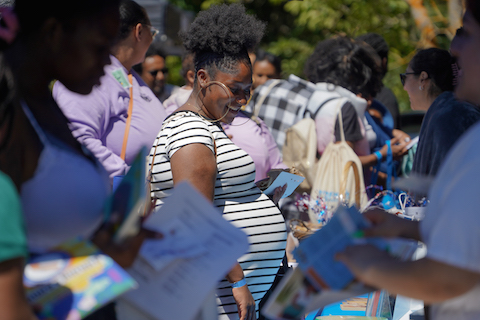
08 Sep Lawmakers Hear From Advocates on ‘State of Black Maternal Health’

Antonio Ray Harvey | California Black Media
Adjoa Jones is a Los Angeles-based health and community leader who has dedicated her career to advocating for equitable birth outcomes for Black mothers and infants.
Participating in a legislative briefing hosted by the California Black Health Network on Aug. 27, Jones shared two stories that shed light on the disproportionately high rate of pregnancy-related complications and deaths among Black women.
Two Black women in Southern California, Jones says, suddenly passed away after giving birth. From Jones’s perspective, those maternal mortalities could have been prevented.
“I come to you speaking from the voices of our community
From the stories of two unforgettable mothers, but it really speaks to the most preventable tragedies,” said, Jones, who is the director of African American Infant and Maternal Mortality Prevention Initiative at the L.A. County Department of Public Health.
“It’s not just impacting California, but our nation far and wide,” Jones added during the event titled “The State of Black Maternal Health” and held at the California State Museum in Sacramento.
Participants highlighted several past and current bills going through the state Legislature that focus on improving maternal health equity. The proposals address systemic inequities to improve the healthcare experiences of Black women during pregnancy, labor, and postpartum.
For example, Assembly Bill 2319, authored by Assemblymember Lori Wilson, D-Suisun City, was signed into law by Gov. Gavin Newsom in 2024. It mandated that healthcare providers in California complete implicit bias training by June 1, 2025.
Panelists included Sandra Poole, health policy advocate for the Western Center on Law and Poverty, and Brittany Chambers, associate professor for the Department of Human Ecology at the University of California at Davis.
Rounding out the expert panelists were Palav Babaria, deputy director for the California Department of Health Care Services, and Zea Malawa, director of Expecting Justice.
Rhonda Smith, the executive director of CBHN, served as the host and moderator of the briefing. CBHN, a Black-led organization founded in 1978, works to advance health equity and ensure all Black Californians have access to high-quality, equitable healthcare.
“There are amazing and incredible women who are doing amazing work here in the state,” Smith said of the panelists who discussed potential policy solutions and accountability to improve outcomes.
During Jones’ presentation, she shared the tragic stories of two women. One was April Valentine, who died on Jan. 10, 2023, after giving birth at Centinela Hospital Medical Center in Inglewood.
According to reports, Valentine died from a blood clot, a pulmonary embolism, that formed in her leg and circulated to her lung. A well-known complication during pregnancy. Valentine’s family members said her condition was preventable, and they filed a wrongful-death claim.
The second woman, 32-year-old Briget Cromer, died on March 2, 2023, at California Hospital Medical Center, hours after giving birth to her fifth child, a baby girl. Her family believes her death was due to medical negligence and has launched a campaign for justice.
Her family’s legal team filed a formal complaint with the U.S. Department of Health and Human Services, alleging systemic racial bias in care.
According to the California Department of Public Health, Black women are more likely than their counterparts to die during pregnancy. They represent 5% pregnancies in the state but account for 21% of pregnancy-related deaths.
Jones said she became a “doula” to the fathers of Jones’s and Cromer’s children and helped them “manage their emotions,” she said
>>>Doulas Provide Much-Needed Tradition of Support to Birthing Parents<<<
“We’re doing all that we can to ensure that pregnancy is uplifted (and) pregnancy is a place that’s where folks can enjoy the journey, Jones said. We just don’t want our (health) systems to continue to be negligent toward Black women, Black families, and Black people.”
Sen. Akilah Weber Pierson, D-San Diego, an obstetrician-gynecologist who has practiced medicine in San Diego, was the keynote speaker at the legislative briefing.
Weber Pierson said the crisis stems from systemic issues like structural racism, bias in healthcare, and lack of access to quality care, which contribute significantly to health disparities.
“Here in California, we tragically lose another mother due to pregnancy-related complications every five days,” Weber Pierson said. “Here and nationally, Black mothers are three to four times likely to be one of those mothers lost. That’s coming from 40% of maternal deaths.”
Medical professionals, advocates, and community leaders shared data, personal stories, and policy solutions to guide policymakers. The organizers concluded the briefing with a clear set of action-oriented takeaways should be provided to improve birth outcomes for Black women in California:
- Effective implementation of policies.
- Accountability at the system level.
- Collaboration between the healthcare system, agencies, and community.
- Learning and experiences about “how to” provide equitable, culturally competent care versus. Just a focus on implicit bias training.
- Commitment to resources and support for the long term.
Weber Pierson said understanding that access to quality, culturally competent care can address underlying conditions, provide crucial support during pregnancy, and mitigate the effects of systemic racism and bias could contribute to combating disparities.
“We must care for, protect, and invest in Black women,” Weber Pierson said. “Because when we do that, we are investing in all women, we are investing in all families, and we are investing in all our communities.”






No Comments